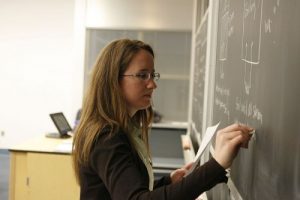The Contingent Labor in the Profession Committee of the MLA welcomes you to join our evening panel session:
645. Scholarly Teaching / Teaching as Scholarship: Contingent Faculty Members as Teacher-Scholars
Saturday, 7 January, 5:15–6:30 p.m., 104B, Pennsylvania Convention Center
Program arranged by the MLA Committee on Contingent Labor in the Profession
Presiding: Veronica Popp
1. “Making Lore Theoretical: Forging Reciprocal Relations between Pedagogy and Theory,” Jessie Casteel, Univ. of Houston, University Park
We move increasingly toward a workforce teaching composition that is overwhelmingly composed of graduate students and adjunct instructors; these populations often have limited time for the study of theory, and may even never have been introduced to theories of composition pedagogy in their training – if, indeed, they were trained in any pedagogy at all. Many of us are graduate students, still immersed in the beginnings of pedagogy. Others are versed in pedagogies that have little to do with the subjects they teach, such as my colleague with a masters in theater set design who teaches basic writing. Moreover, the realities of contingent labor often mean that we work long hours for meager pay, leaving us precious little time to further our pedagogical studies. And we are often provide little opportunity for support, collaboration, or communication with our fellow contingent laborers, treated instead as independent contractors who hear from our institutions only when our paperwork is late and meet each other only in passing.
Too often, these factors give us little confidence in ourselves as instructors or effective networks for collective action, and thus little ammunition to resist the imposition of scripted courses and standardized assessment. But roboticization is not the answer; every move in this direction has produced disaster. Instead, we must find ways to overcome the isolation of contingent labor and draw upon each other as resources. We must embrace the oft-stigmatized lore. In these ways and for these reasons, lore becomes theory for us as composition instructors. It is theory made relevant and concrete. While lore often obscures the exact theory that lies behind its inception, it gives us the ready-made application of theory in contextualized praxis. Lore is fast, lore is local, lore is available, and, most of all, lore is contextualized. For contingent laborers, lore is especially valuable as theory because of the fact that it is already translated into specific practices and comes with clear, localized context. The theory we glean from pedagogical texts is not so readily digested and evaluated because it lacks the critical context that imbues lore by its very nature. And we must admit that the time and attention required to supply such context to abstract theory is thin on the ground for contingent laborers. And, perhaps most importantly, the connections we forge while trading in lore can also form the foundation of a collective network that might more effectively resist the corporate university’s push toward standardization.
2. “The Implications of the New Majority of Nontenurable Faculty Members for First-Year Composition Curricula and Critical Pedagogy,” Sarah Austin, United States Air Force Acad. Preparatory School
Of late, much discussion has arisen around university employers’ treatment of the “new” majority of contingent faculty. However, little is being said regarding two important points: First, that in the field of rhetoric and composition and in first-year writing classrooms, especially, this majority of contingent faculty is not at all new. Secondly, that some attention should be paid to what effects this writ-large university labor shift may be having on pedagogical and curricular decision-making within composition programs, particularly as they pertain to faculty’s academic freedoms and the teaching of critical thinking skills. As such, this project sought to attend to both of the above issues by documenting the history of rhetoric and composition’s labor force, aligning that history to activism and critical pedagogies and, through a local example, discussing the implications of the “new” majority of untenurable faculty on the pedagogies and curricula utilized in first-year composition. My findings indicate, as suspected, that the majority of contingent faculty is not new a phenomenon to the field of composition. However, this contingent majority does affect the ways in which critical thinking and pedagogies may be used within the first-year composition classroom. Results seem to show that such a shift in university faculty profiles will indeed affect professors’ abilities to wield traditionally understood ideas of academic freedom. Drawing on Foucault’s notions of power and his term “specific intellectual,” individuals within composition departments, and perhaps, university-wide, are able, through conscious action to uphold the democratic ideals of a post-secondary education: to create civic-minded, critical thinkers.


